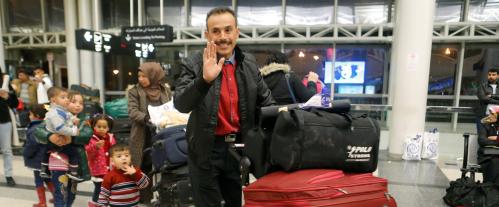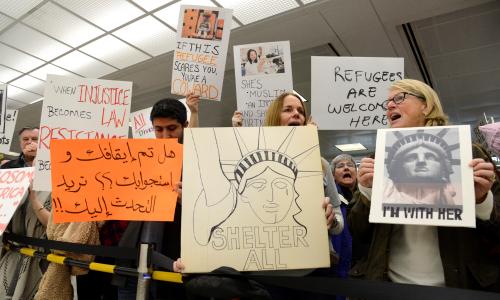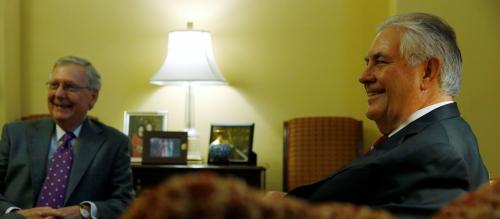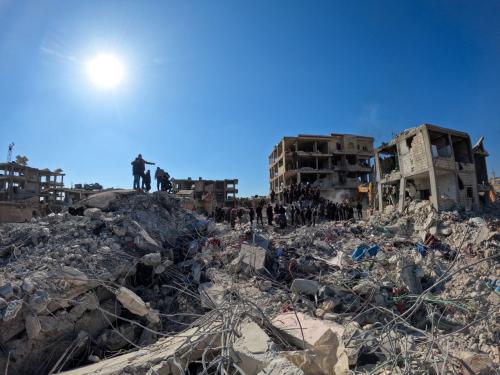Tomorrow, former CIA Director Mike Pompeo, President Trump’s pick to replace Rex Tillerson as secretary of state, will come before the Senate Foreign Relations Committee. The hearing is an opportunity for congressional leaders to question him on a broad range of consequential subjects. Resourcing the State Department should be first on the list. It is difficult, if not impossible, to craft and implement an effective set of strategies on any foreign policy issue without the personnel in place to do so.
But exploring Pompeo’s views on refugee policy should also be a high priority. That’s for three reasons.
First, Pompeo has a history of expressing deep distaste for refugee policies he views as lax. While in Congress, he cosponsored a bill calling for an immediate ban on the entry of all refugees, regardless of their country of origin. The measure would have gone farther than then-candidate Trump’s controversial proposal to bar Muslim immigration. Later that year, after returning home from a study tour focusing on the migration crisis in Europe, he argued in support of Trump’s instincts on these issues in the Wall Street Journal.
Second, while the State Department always plays a critical role in the design and implementation of refugee policies, that is especially the case this year, as world leaders drive toward concluding two years of work on a new Global Compact for Refugees. The United States remains a party to those discussions, and its views are likely to influence a framework that will guide responses to displacement for decades to come – I hope for better, potentially for worse.
Third, as I have argued elsewhere, U.S. refugee policy is enormously geopolitically consequential. How the United States conducts itself—not just with respect to refugee admissions, but to the humanitarian system broadly—could bear on the trajectory of populism in Europe and at home, our shared exposure to state fragility in the Middle East, and trust in institutions everywhere. That’s not to mention the lives and wellbeing of millions of displaced people around the world.
With that in mind, here are a few questions the committee might pose to Pompeo:
- President Trump capped refugee admissions at 45,000 people this year—the lowest number set by any White House since the practice began in 1980. According to State Department data, the United States is on track to admit less than half that number. What is your view of the current pace of admissions? What do you see as the consequences of this policy for our relationship with our allies in Europe and our partners in the Middle East?
- Of the refugees the United States has resettled thus far this year, only 44 of them have been Syrian. In your view, is that the right number? How do you see refugee resettlement fitting in to our broader Syria policy?
- In a formal written contribution providing input to the Global Compact for Refugees, the administration expressed reservations about the proposed Global Platform, designed to increase responsibility sharing, calling instead for a regional approach. Do you agree with this view?
- As the United States curbs its refugee resettlement program, providing other forms of assistance to displaced people where they are—overwhelmingly in developing countries, several of them fragile—takes on new importance. As secretary of state, what steps will you take to ensure that the United States delivers appropriate humanitarian and development assistance? What link, if any, do you see between this assistance and U.S. national security?
- The Trump administration has expressed its support for involving new actors in the search for sustainable solutions to protracted displacement. How will you work with nontraditional partners—including municipalities and the business community—to ensure that refugees have opportunities to learn and to earn, in classrooms and in labor markets?
Pompeo’s answers to these questions could reveal a great deal about how he plans to approach a sensitive, consequential issue. I hope he plans to be more forward leaning than his predecessor. But given his record, I doubt it.
The Brookings Institution is committed to quality, independence, and impact.
We are supported by a diverse array of funders. In line with our values and policies, each Brookings publication represents the sole views of its author(s).








Commentary
5 questions for Mike Pompeo regarding refugees
April 11, 2018